#shipping has no moral value
Text
The fandom experience is watching Those spi/rk fans say the problem is that they paired spock with the Wrong woman and everybody was fine with Uhura and Spock in the aos movies like i do not remember very easily with no trouble at all the metric shitton of racist misogynistic biphobic sludge that came from fandom from that other thing actually happening in those movies.
Like, I was not even IN the fandom then and I saw all that from the outside, so that means it would have been worse behind the curtain. This is not the argument you think it is.
#trek shit#shipping is not activism#is present in this post#shipping has no moral value#the show potentially shipping spock with uhura is not more moral than what they did do#and frankly considering he's like in her direct chain of command that'd be Worse???#they skirted that in the movies and gave her the upper hand to make it not be a big wtf#i know we're all on the loser gay website but christ since y'all attributed shipping worth scales on some kind of#morality or representation scale you have gotten so weird about it that#we're like one of those isolated ponds with Weird As Fuck fish in it that exist nowhere else#i'm sorry to let you know but m/f pairings are not wrong in characters with no confirmed sexuality lol#there is a reason nobody takes any of us seriously and it's entitled nonsense like this#we can't even use the term queerbait anymore bc you changed the meaning so awfully that now it's just willthey/won't they#and not active homophobia like please stop
9 notes
·
View notes
Text



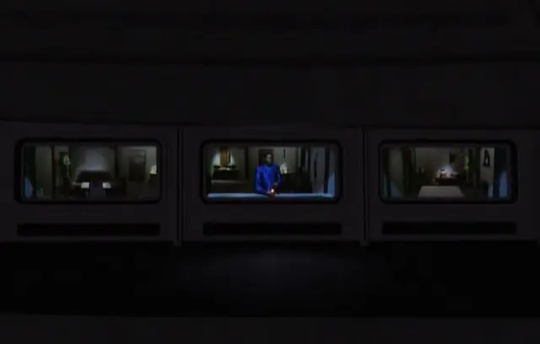



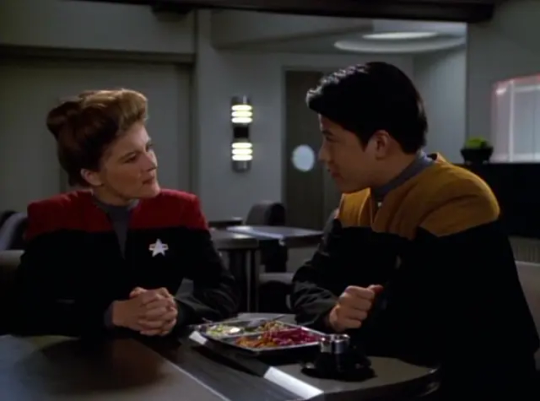
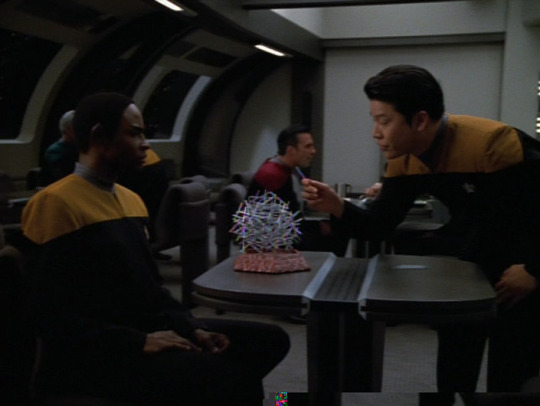
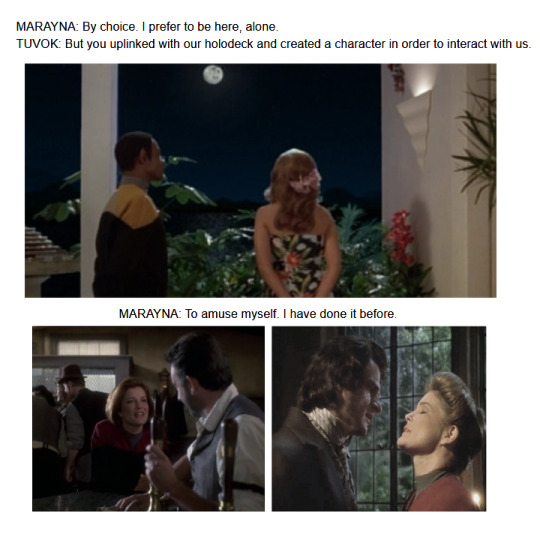
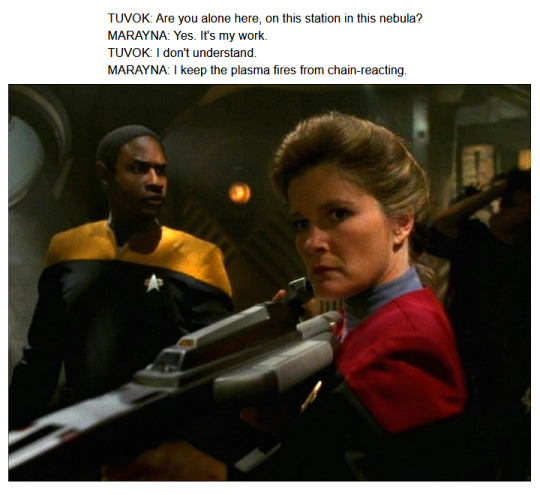

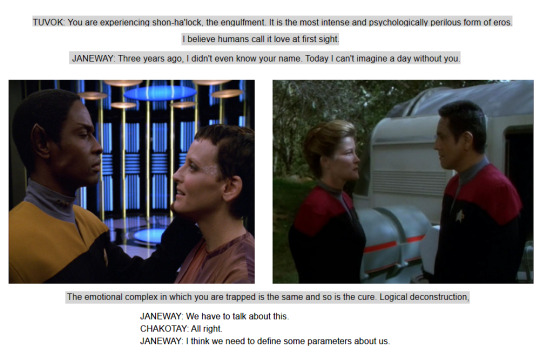

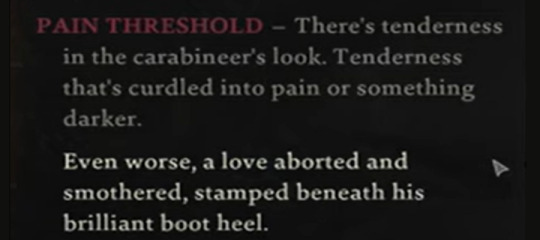


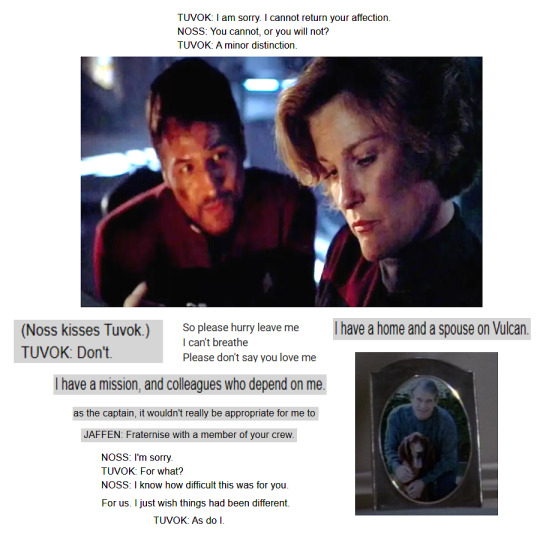

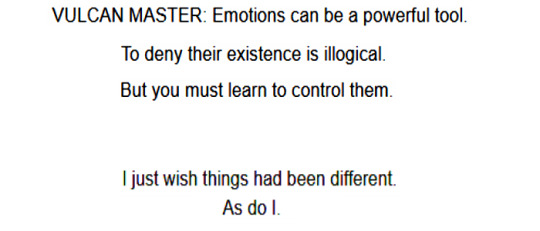

[Tuvok & Janeway: Control, Distance, Duty & Connection.]
Sources: St Voyager Transcripts / Mitski 'First Love Late Spring' / Disco Elysium
#web weaving#star trek web weaving#st voyager#Kathryn Janeway#Tuvok#be the change you want to see in the world - make a long post about Tuvok & Janeway's similarities <- angel on my shoulder#I feel like a lot of people see them as 'opposites attract' sort of friends where Janeway is unhinged & Tuvok reigns her in#but in reality I think that while there is that element in there (exacerbated HEAVILY by their delta quad circumstances)#what I see most in their relationship is how they both value loyalty and duty above all and are extremely rigid with themselves#and the people around them. How they both have to maintain distance from others bc of their positions as captain & vulcan#I hate when people dismiss Tuvok as not being remotely interested in Maryana or Noss - it erases an interesting struggle that he and Janewa#both share - their desire to stay loyal to their spouses vs the 70 years of loneliness that that loyalty demands of them#But they BOTH triumph and they BOTH remain loyal (Tuvok until he returns to T'Pel and Janeway until Mark informs her that it's over)#and for both of them it's a little bit insane for them to do that.#Isn't it more interesting that Janeway and Tuvok both have feelings for people other than their spouses but don't give in#to that temptation?#They're both people who live very fastidiously by codes. Either written codes or moral codes - they very rarely if ever do things because#it's what THEY want to do. I'd say they're the least emotion-driven members of the crew and yes I'm including Seven because Seven#has a very...how to describe? It's a blunt and insular selfishness. She does what SHE wants to do and doesn't really care about others.#To me that's emotion-driven. Or...personal desire-driven? Not a bad thing at all but very different from Janeway & Tuvok who#are always more 'this is logical' or 'this is for the crew' rarely do they think 'this is what I want' bc they can't afford to#for different reasons (captain & vulcan)#they both also are in the most 'caretaking' positions on the ship from my POV. Security and Captain - both are directly in charge of#ship and crew safety.#Janeway & Tuvok#star trek voyager#st voy#when I say caretaking I'm NOT saying they're everyone's mom and dad or whatever - I'm saying they're in positions where they always#have to think about the greater good and the crew as a whole and how much danger is acceptable etc etc.#Janeway is always killing herself for the crew but Tuvok is right there beside her
74 notes
·
View notes
Text
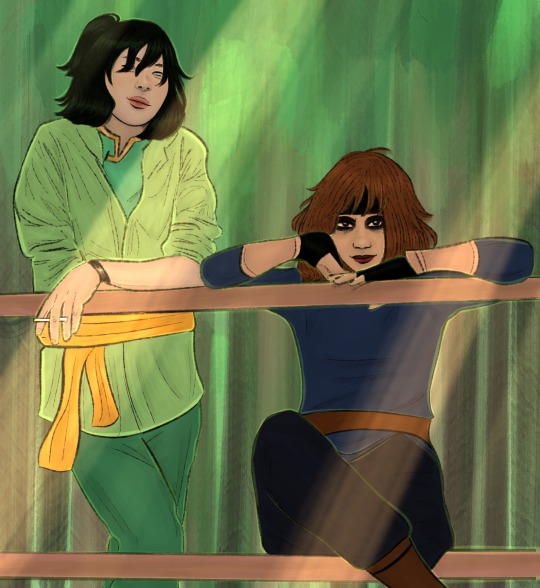

my "no canon interactions" gfs. and yes they smoke weed
#id in alt text#avatar the last airbender#atla#toph#smellerbee#smellerbeextoph#figured i may as well draw my most obscure ship for#atlasapphicweek#oldergaang#since everyone else loves throwing random dykes together heres my favorite example because it actually MAKES SENSE#also this is like the second time ive ever drawn smellerbee#so ive never actually given thought to her older design#but at the very least i think she'd have to outgrow her makeshift armor#and maybe she steals some of longshots shirts#and my older design for toph just has her looking chiller and dykier bc duh#also yes she would cut her hair. uninternalizing those confucian values#anyway. we need more femslash thats like. grimy morally ambiguous dirtcore dykes that smoke weed#and less ultra feminine princesses supergirl kissing or whatever#baby butches getting high in a forest!!!!! thats what its about babey!!!!!#its MY house and i get to choose the femslash#art#mart
157 notes
·
View notes
Text
sometimes you read something for a fandom you were crazy over years ago and you encounter one of the ships you loved back then and you just think “yeahhhh…. this is still great :) way to go younger me you were so based about this actually :)”
#anyway I still care a lot about Obitine apparently#their respective commitment to their respective ideals and moral codes… the way they love each other more than life#(literally. they’re so willing to die for each other.)#and yet that never leads them to violate who they /are/ or who the other person is#Satine is willing to never see him again rather than ask him to leave the Order. he is willing to leave the Order all she has to do is ask#they are able to rest in their love for one another bc they know the other loves them in such a way that they would never ask#for their compromise#idk this makes very little sense it’s 2 a.m. I’m delirious I have church in the morning but I wanna rewatch some Clone Wars now#hfhfhfhhdhdhdhehdhdhdhfbbdsjsjfhfj#gurt says stuff#edit: wait actually this is so funny—bc I just realized that Din Djarin and Obi-Wan are quite similar in a lot of ways#so the parallels here are incredibly funny to me for some reason. the Kryze women just have a Thing for reserved men who are#completely devoted to their religious values and would do practically anything for their adopted family huh#(ftr I don’t know if I ship DinBo or not but I do understand the appeal and I am open to the possibility of the writers play it right#still bitter about losing Cara tho. bc I was SO curious to see how Misters Filoni and Favreau were going to develop that#n I had a vague suspicion based on my knowledge of how Filonis brain and stories work that ~something~ may have been meant to happen there)
25 notes
·
View notes
Text
"they're basically the same person" except the different names growing up in different countries knowing different people having entirely different childhoods and circumstances and hobbies and personalities and appearances and fashion and-
sigh
#yes this is about that 'ravioli is twincest' person. it isnt#and even if it WAS then the standard fandom rules apply: don't like don't read and your kink is not my kink and ship and let ship#you don't have to like any of it and then it's your responsibility to stay away from it#sincerely: a person who has been in fandom for too long and is tired of people like this#it's common courtesy to keep discourse out of the main tags too#ALSO the racism isn't cute btw. yaoi literally just means gay ship why are you ascribing moral value to the japanese word vs western term#they mean the same thing they're literally the same thing that's just racism if you say that yaoi is bad but gay ship is fine#can't believe i had to wake up to this
0 notes
Text
South Africa’s genocide case has put the spotlight on a deeper fault line in global geopolitics. Beyond the courtroom drama, experts say divisions over the war in Gaza symbolize a widening gap between Israel and its traditional Western allies, notably the United States and Europe, and a group of nations known as the Global South — countries located primarily in the southern hemisphere, often characterized by lower income levels and developing economies.
Reactions from the Global North to the ICJ case have been mixed. While some nations have maintained a cautious diplomatic stance, others, particularly Israel’s staunchest allies in the West, have criticized South Africa’s move.
The US has stood by Israel through the war by continuing to ship arms to it, opposing a ceasefire, and vetoing many UN Security Council resolutions that aimed to bring a halt to the fighting. The Biden administration has rubbished the claim that Israel is committing genocide as “meritless,” while the UK has refused to back South Africa.[...]
As a nation whose history is rooted in overcoming apartheid, South Africa’s move carries symbolic weight that has resonated with other nations in the developing world, many of whom have faced the burden of oppression and colonialism from Western powers.
Nelson Mandela, the face of the anti-apartheid movement, was a staunch supporter of the Palestine Liberation Organization and its leader Yasser Arafat, saying in 1990: “We align ourselves with the PLO because, akin to our struggle, they advocate for the right of self-determination.”
Hugh Lovatt, a senior policy fellow with the Middle East and North Africa Programme at the European Council on Foreign Relations, said that while South Africa’s case is a continuation of its long-standing pro-Palestinian sympathies, the countries that have rallied behind it show deeper frustrations by the Global South.
There is “a clear geopolitical context in which many countries from the Global South have been increasingly critical over what they see as a lack of Western pressure on Israel to prevent such a large-scale loss of life in Gaza and its double standards when it comes to international law,” Lovatt told CNN.
Much of the non-Western world opposes the war in Gaza; China has joined the 22-member Arab League in calling for a ceasefire, while several Latin American nations have expelled Israeli diplomats in protest, and several Asian and African countries have joined Muslim and Arab nations in backing South Africa’s case against Israel at the ICJ.
For many in the developing world, the ICJ case has become a focal point for questioning the moral authority of the West and what is seen as the hypocrisy of the world’s most powerful nations and their unwillingness to hold Israel to account. [...]
Israel sided with the West against Soviet-backed Arab regimes during the Cold War, and Western countries largely view it “as a fellow member of the liberal democratic club,” he added.[...]
“But the strong support of Western governments is increasingly at odds with the attitudes of Western publics which continue to shift away from Israel,” Lovatt said.
Israel has framed the war in Gaza as a clash of civilizations where it is acting as the guardian of Western values that it says are facing an existential threat.
“This war is a war that is not only between Israel and Hamas,” Israeli President Isaac Herzog told MSNBC in December. “It’s a war that is intended – really, truly – to save Western civilization, to save the values of Western civilization.”
So far, no Western countries have supported South Africa’s case against Israel.
Among Western states, Germany has been one of the most vocal supporters of Israel’s campaign in Gaza. The German government has said it “expressly rejects” allegations that Israel is committing genocide in Gaza and that it plans to intervene as a third party on its behalf at the ICJ.
An opinion poll by German broadcaster ZDF this week however found that 61% of Germans do not consider Israel’s military operation in the Gaza Strip as justified in light of the civilian casualties. Only 25% voiced support for Israel’s offensive.
But it is in Germany’s former colonial territory, Namibia, that it has attracted the fiercest criticism.
The Namibian President Hage Geingob in a statement on Saturday chided Berlin’s decision to reject the ICJ case, accusing it of committing “the first genocide of the 20th century in 1904-1908, in which tens of thousands of innocent Namibians died in the most inhumane and brutal conditions.” The statement added that the German government had not yet fully atoned for the killings.
Bangladesh, where up to three million people were killed during the country’s war of independence from Pakistan in the 1970s, has gone a step further to file a declaration of intervention in the ICJ case to back South Africa’s claims, according to the Dhaka Tribune.
A declaration of intervention allows a state that is not party to the proceedings to present its observations to the court.
“With Germany siding with Israel, and Bangladesh and Namibia backing South Africa at the ICJ, the geopolitical divide between the Global South and the West appears to be deepening,” Lovatt said.
Traditionally, the West has wielded significant influence in international affairs, but South Africa’s move signals a growing assertiveness among Global South nations that threatens the status quo, says Adekoya.
“One clear pattern emerging is that the old Western-dominated order is increasingly being challenged, a situation likely to only further intensify as the West loses its once unassailably dominant economic position,” Adekoya said.
19 Jan 24
2K notes
·
View notes
Text
I’ve been thinking a lot about fandom recently, both as someone who has engaged with it regularly for over a decade on various platforms and also as someone who has increasingly become disenchanted with those spaces. Not only because of pervasive issues of (especially anti-Black) racism, misogyny, transphobia/homophobia, and the like, but the particular way those things take shape within fandom.
At the most basic level I think fandom has a fundamental methodological problem with the way it approaches texts, be they shows, books, movies, etc. What I mean is that people almost invariably approach fandom at the level of character, often at the level of ship - your primary way of viewing a text is filtered through favourite characters and favourite relationships, as opposed to, say, favourite scenes, favourite themes, favourite conflicts.
This is reinforced through the architecture of dominant platforms that host fan content, particularly AO3 - there are separate categories for fandom, character and ship, and everything else is lumped together in “Additional Tags.” You cannot, for example, filter for fics on AO3 by the category of “critical perspective” or “thematic exploration”. There is no dedicated space for fan authors to declare their analytical perspective on the text they are writing about. If an author declares these things, they do so individually, they must go out of their way to do so, because there are no dedicated or universally agreed-upon tags to indicate those things, and if your fanfiction has a lot of tags, that announcement of criticality gets mushed together in a sea of other tags, sharing the same space with tags like “fluff and angst” or “porn without plot.” Perhaps one of the few tags closest to approaching this is the tag “Dead Dove: Do Not Eat,” which doesn’t indicate perspective or theme but rather that there is, broadly, some kind of “problematic content” contained therein - often of a sexual nature, frequently as a warning about “bad” ships.
Now this is not an inherent problem, as in, it is not inherently incorrect to approach a text and primarily derive pleasure from it by focusing on a given character or relationship. And I think a lot of mainstream media encourages (even requires) audiences to engage with their stories at these character- and ship-levels. The political economy of the production of art (one which is capitalistic, one that seeks to generate comfort, titillation, controversy, nostalgia, or shock for the purposes of drawing in viewership, one that increasingly pursues social media metrics of “engagement” and “impressions”, one that allows for the Netflix model of making two-season shows before cancelling them, as well as a whole host of other things) enforces a particular narrative orthodoxy, one that heavily focuses on the individual interiority of specific characters, one that is deeply concerned with the maintenance of white bourgeois middle class values of property ownership, the nuclear family, normative heterosexual sexuality and gender, settler-colonial ideas about community and environment, etc. If you do not care about the familial drama surrounding Shauna cheating on her husband in Yellowjackets, for example, because you think the institution of monogamous marriage and the nuclear family is stupid and violent and heternormative, then you will have a difficult time engaging with the show in general. We exist within a deeply normative (and frequently reactionary) media environment that encourages us to approach art in a particular way, one that privileges the individual over other narrative components (settings, themes, conflicts, ideas, political and moral perspectives, structure, tone, etc).
All of which culminates in priming fans to engage with art at these levels and these levels alone, even when that scope is deeply inappropriate. A standout example I recently encountered was browsing the fandom tags on tumblr for the movie Prey - a movie that recontextualises the original Predator film by setting it in colonial America to make the argument that the horrific violence of white colonists and imperial soldiers is identical to the violence we see the Predator do to human beings. It is a movie that makes the argument that, despite this alien monster running around killing people, the villains of the franchise are these occupying soldiers and settlers, an alien force who themselves have just as little regard for (indigenous) human life.
And when browsing the tags on tumblr, what I found was dozens upon dozens of horny posts about how hot the predator monster was. Certainly there were discussion of the film’s narrative, and these posts got a good amount of notes, but the tags were heavily dominated with a focus on the Predator itself. People were engaging with this film not as a solid action movie with interesting and compelling anti-colonial themes, but as a way to be horny about a creature that is, ironically, a stand-in for white settler indifference to (and perpetuation of) indigenous suffering. And if this is your takeaway from an extremely straightforward film with a very clear message, this is not merely a failure to comprehend the content of a text, this is something beyond it - a problem that I think is due in part to the methodological problem of approaching all texts as vessels for bourgeois interiority, individual but ultimately interchangeable expressions of sexuality, perhaps best-expressed by the term “roving slash fandom,” a phenomenon wherein fans will move from one fandom to the next in search of two (usually white, usually skinny) guys to draw and write porn of, uncaring of any of the surrounding context of the stories they are embedded in, and consequently dominating a large sector of fandom discussion.
This even gets expressed in the primary ideological battleground of fandom itself, the ridiculous partitioning of all fan conflict into “pro-“ and “anti-“ shipping compartments. Your stance on engagement with fandom itself historically was (and still is) always first filtered through one of these two labels, describing your fundamental perspective on all texts you engage with. And both of these two labels are only concerned with shipping, as if all disagreements about art can only be interpreted through the lens of what characters you think are acceptable to draw or write having sex. Nowhere in this binary is space to describe any other perspective you might take, what approaches you think are valuable when interacting with art, what themes or stories you think are worth exploring. It’s not just that the pro/anti divide is juvenile and overly-simplistic, it is a declaration that all fan conflict must be read through the lens of shipping and shipping only - the implication being that any objections raised, and criticisms offered, is ultimately just bitching about ships you don’t like.
Which, again, I think is a fundamental error of methodology. It leaves no space for people to discuss the political and moral content of a work, the themes of a piece of art, the thorny issues of representation not just as expressed through individual characters but entire worlds, narratives, settings, and themes. You are always hopelessly stuck in the quagmire of “shipping discourse,” and even rejecting that framework will inevitably get you labelled as either pro- or anti-ship anyway - and you will almost invariably be labelled an “anti” if you express any kind of distaste for the bigoted behaviour of fans or the content of the text itself, again reinforcing the idea that this is all just pointless whining online about icky ships you personally hate.
And this issue is best perhaps epitomised by reader insert fanfiction, circumventing any need for you to project onto a character by literally inserting yourself into fiction, primarily in order to write/read about a character you want to fuck. This then intersects in particularly disgusting ways with real world politics, such as reader insert fics about Pedro Pascal going with you to BLM protests. Even if this is (incredibly over-generously) interpreted as a very poor attempt at being “progressive,” it still demonstrates that many (white) fans are often incapable of thinking about anything outside of a character-centric perspective, quite literally centring themselves in the process, and consequently they think it’s totally appropriate to do things like that. The fact that this is also frequently a racist lens is not coincidental, because again, a chronic focus on (fictional) individuality prohibits any structural perspective from entering the discussion, which necessarily excludes a coherent or useful perspective on systemic issues, where people come to the conclusion that the topic of police brutality is little more than a fun stage to enact whatever romantic shenanigans you want to get up to with a hot guy.
I will stress, again, that it is not a moral sin to have a favourite character, nor is it bad to enjoy reading about two guys having sex in fanfiction. I enjoy and do those things, I engage with fandom often through a character-centric lens (see my url) - because it’s fun! But I think that this being the dominant mode of engagement inherently excludes and marginalises all other approaches, and creates a fandom space where the most valuable way to talk about media is to discuss which two characters you most enjoy imagining fucking each other
3K notes
·
View notes
Text
Who Builds Theseus' Ship?
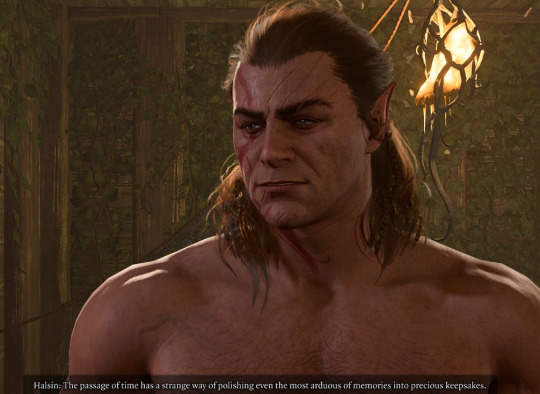
This ties in to a greater discussion about Larian's changes to the game post-Full Release, and whether you consider those changes to be a good thing or a bad thing. Personally speaking, the quality-of-life and gameplay mechanics improvements were appreciated, while the direct changes to characters and especially characterization were not so much.
In such discussions, I often see people downplaying the actual changes to characterization that have been made thus far as "minor" things, but I often see one of the most glaring examples of a characterization change left out, because so many people aren't even aware of it ever happening:
Halsin.
For those who don't know, if you were romancing Halsin at the time of the original full release, and for almost four months afterward, if you took him with you to Act 3's orgy scene in Sharess's Caress, he would open up about a situation in his distant past. He would tell you about how he had briefly been "something between guest, prisoner, and consort" in a drow House, and been kept there for three years before escaping.
He stated that this was something that happened "a long time ago", when he was "a foolhardy young druid", which would mean it would likely have been between ages 100 and 245 — or at minimum 105 years ago, and at (likely) maximum 250 years ago. He closed the discussion with a line that really struck me, and that gave me such an appreciation for his character, and for the writers who had created it:
The passage of time has a strange way of polishing even the most arduous of memories into precious keepsakes.
As someone in their late-20s, with a number of traumatic events in my past, this resonated so much both with my experience of those events – once harrowing and haunting, now just simple happenings that do not affect me the way they once did – and as an inspirational message, that hurt would not necessarily linger forever.
Not only that, I really valued the insight it gave into Halsin's personality, further showing him to be someone who was deeply complex and meditative, always looking for meaning and something to take away or learn from any experience. It also served to showcase the likely reality of the relationship elves and druids both would have to the concepts of time and memory. (Another example of this is the experience of Shadowheart's father compared to her mother at the hands of the Sharrans.)
I started playing the game almost immediately upon its release in August, and was intrigued by Halsin from the start. He was someone who was kind and heartfelt, but also very settled in himself and with a simultaneously rigid and very flexible moral code. It was that complexity that drew me to him, and I appreciated the inclusion of a character distinct from the Origin companions, all at close to the lowest point of their lives.
It was to my surprise to find that this appreciation for his character and perspective on his Act 3 revelation was not unanimous. As it turned out, there was a vocal group of people claiming that this writing was problematic, and that Halsin clearly didn't even realize he was actually traumatized, and that Larian needed to fix it. Not everyone joining in with this crusade had even played the game.
And, ultimately, in a pattern they have continued to follow, Larian responded. They fixed it. At the end of November, as part of Patch 5, they uploaded an edited version of the scene with new dialogue, where the player could express this "reality" to Halsin, in one of the most gallingly patronizing statements I've ever seen.
Sounds traumatic. You may need to reflect on that.
(If someone said this to me after I had opened up to them about my trauma and my experience of it to them, we would not be maintaining a cordial relationship afterward.)
Halsin's new response to these dialogue options is a cringing, self-deprecating cascade of how the player is of course right, and he should have known better, and time could "prove to be a trickster on one's recollections" and that perhaps he had "lost perspective".
Quite frankly, it is a completely different character answering, and an almost directly opposing overall message about the role of time in healing, and the path forward when it comes to trauma. No more "one day these events will not hurt to recall the way they do now". In its stead: "only healing that looks a specific way and follows a specific path is acceptable - anything else and you are simply a poor fool lying to yourself."
The following quote is from a comment left on a video of Halsin's original dialogue in that scene, before the changes, and is just one example of how much that representation meant to more than just me to see:
That said, Halsin is trauma recovery goals for me absolutely. Being able to remember without actually being triggered? Being able to fully and freely engage HOW ID LIKE TO instead of being fettered by trauma responses? Goals. I don’t know if I’ll ever get there 100%, we don’t get elven lifetimes irl, but his level of healing brings me hope.
Ultimately, this post is not meant to argue that you should agree with me that one is better than the other. More so, I want to highlight that this existed — for many people, this was their experience of events and characters, and that is not so easily redacted. And I also want to just state, for the record, that Larian's way of approaching narrative and characterization changes to their full-release game has been incredibly frustrating. I did not agree, in August, to play an Early Access game with the inherent understanding that any potential narrative aspect might change at any time. I purchased a full-release game, and immersed myself in the story and the characters, to get to know them as the writers had originally presented.
And when Larian makes these changes based on fan feedback, they are explicitly making decisions about which fans matter, and specifically, which fans matter most. Rather than allowing everyone to experience the story they decided to tell, and draw from it what they take away, and let that spark discussion and engagement, they made the decision to defer to some fans over others, and prioritize their experience of the narrative — something that, no matter how well-intended, is always going to leave a bitter taste in my mouth.
#voidling speaks#bg3#bg3 meta#my meta#it feels insane to have to do archival work for a six month old game#but here we are#halsin#larian#larian critical#baldur's gate 3#bg3 halsin#meta
800 notes
·
View notes
Text
Recently, I've been seeing an influx of antis who believe that problematic/taboo content is bad because it's all "shock value" or "fetish content."
I need to remind everyone that art does not have to have deeper meaning to bring you joy.
So what if what you mostly read is omegaverse smut? So what if you enjoy art of your taboo ships doing things that aren't directly sending a message? So what if the thing you enjoy is seen as "meaningless" because it does not outright criticise something in it?
When we say that we should be allowed to explore dark fiction, we don't just mean content that dictates a certain moral ideal— we mean every single piece of fiction, "icky" or not!
Because— guess what happens when we ban these "gross," "meaningless" artworks? We'll end up arguing over what is "meaningful" enough, and then everything becomes restrictive! This is no slippery slope fallacy. This is a pattern every attempt at censorship in history has followed.
To support "gross" fiction is to support dark fiction, and to support dark fiction is to support our collective freedom to fiction.
Keep reading what makes you smile 💜💜
#profiction#proship#proship please interact#proshipper#proshippers please interact#fiction is not reality#proship positivity
584 notes
·
View notes
Note
So. Hear 5. Nika. Loony Tunes Luffy, if you will. Tell us your thoughts on him and any potential meta? 👀 I’ve been aching to hear it from you since we first saw him go Full Silly Boy.
it's hard to answer this, because i have so many thoughts. i'm just going to try and start from the biggest points and move down.
i like gear five a lot, and i think this development feels very appropriate as a culmination of both luffy's character and the themes of one piece as a whole because of how it interacts with three extremely dominant motifs that have reoccurred throughout the story: freedom, laughter, and the sun.
from the very beginning of the story, luffy has acted, in small ways and big, as an agent of complete freedom. from his first meeting with coby to his breakout at impel down to the liberation of wano, what luffy does is destroy systems that control and oppress, if only because they are in his way. every strawhat is somehow trapped and held back from pursuing their own dreams when they meet luffy, and he frees them all, along with hundreds of others along the way, whether he's inspiring shirahoshi to venture outside or crushing yamato's manacles. his talent for this has always seemed almost preternatural.
luffy is not necessarily a benevolent person; he doesn't care much about helping people in the abstract. he's selfish. he values freedom for freedom's own sake, not because of any greater moral convictions. he doesn't think much about the negative knock-on effects of things like causing a mass breakout at impel down, and he doesn't really go around seeking out downtrodden and oppressed people to free out of a charitable or selfless instinct, nor does he really do anything because it's the right thing to do. he's dismissive of the idea that he might be a hero.
but because he is a completely uncontrollable free agent, and he doesn't really want anything but for himself and everyone he cares about to be completely free, he constantly collides with the systems of oppression that control his world, and when those collisions happen, it is the systems that fail, time and time again, because oppressive systems always do eventually. they can't withstand the light of day. and because he lives completely confidently and unapologetically, he is constantly inspiring others to do the same.
so by the time we are told about nika for the first time, we already know that what nika is said to do is what we've seen luffy doing for more than a thousand chapters: he frees people, and inspires them, and makes them laugh.
i also find luffy-as-nika to be very interesting and thematically appropriate when positioned in opposition to the various antagonists in one piece who have declared themselves to be gods, frequently some of its most tyrannical and oppressive villains- enel, the celestial dragons, doflamingo. all enslave and imprison people, robbing them of their freedom.
nika is a god of slaves, and a creature of liberation. the natural enemy, as rosinante might say, of that sort of megalomaniacal 'god.'
one piece has also consistently connected the theme of freedom, as embodied through luffy, with the sun since very early on. the sun pirates, former slaves, used the symbol of the sun to wipe away the brand of the celestial dragons. (and aren't i curious to know what jinbei might know about nika- he never did answer who's who's question about it.) the fishmen more broadly view the sun as something to be reached when they are truly free. on wano, the coming dawn is understood as the coming liberation. impel down and the florian triangle, places of indefinite imprisonment, are lightless dungeons where the sun doesn't reach. the sun is freedom.
and luffy has always been thoroughly sun associated, from the visual of his hat to his origin on dawn island in the east blue, to his ship, the thousand sunny.
finally, one piece has always placed a great deal of emphasis on smiles and laughter (laugh tale, joy boy, roger laughed, etc)- but that joy must be real. it can't be forced. we're told again and again, through koala, dressrosa's toys, and most obviously the victims of the failed SMILE fruits, that to force someone to smile, denying them the right to cry, is nothing less than an atrocity. people can't be forced to be happy- they should be happy because they're free.
luffy in gear five is laughing nigh-constantly, but it's just because he's having so much fun. unlike the victims of the SMILE fruits, his endless joy is genuine, because in this form, he is completely free- nobody can stop him, and nobody can control him. as he says himself, he can do whatever he wants.
i know that some people felt this moment was in some way a deus ex machina, but it just didn't feel that way to me, because of how well it plays on the story's established themes and trajectory, as well as concepts like devil fruit awakening having been established hundreds of chapters back.
luffy is the sun, the sun is freedom, freedom is joy. i think it makes total sense.
#one piece#jonny answers#op#opmeta#luffy#gear 5#character meta#long post#what are my thoughts on gear 5 you ask. this isnt even all of them.#sun god nika
419 notes
·
View notes
Text
When attempting to critique the values of a long-running franchise like STAR TREK, it's important to draw a distinction between superficial issues and structural ones.
"Superficial" in this sense doesn't mean "minor" or "unimportant"; it simply means that an issue is not so intrinsic to the premise that the franchise would collapse (or would be radically different) were it changed or removed. For example, misogyny has been a pervasive problem across many generations of STAR TREK media, which have often been characterized by a particular type of leering-creep sexism that was distasteful at the time and has not improved with age. However, sexism and misogyny are not structural elements of the TREK premise; one can do a STAR TREK story where the female characters have agency and even pants without it becoming something fundamentally different from other TREK iterations (even TOS, although there are certainly specific TOS episodes that would collapse if you excised the sexism).
By contrast, the colonialism and imperialism are structural elements — STAR TREK is explicitly about colonizing "the final frontier" and about defending the borders, however defined, of an interstellar colonial power. Different iterations of STAR TREK may approach that premise in slightly different ways, emphasizing or deemphasizing certain specific aspects of it, but that is literally and specifically what the franchise is about. Moreover, because STAR TREK has always been heavily focused on Starfleet and has tended to shy away from depicting life outside of that regimented environment, there are definite limits to how far the series is able to depart from the basic narrative structure of TOS and TNG (a captain and crew on a Starfleet ship) without collapsing in on itself, as PICARD ended up demonstrating rather painfully.
This means that some of the things baked into the formula of STAR TREK are obviously in conflict with the franchise's self-image of progressive utopianism, but cannot really be removed or significantly altered, even if the writers were inclined to try (which they generally are not).
What I find intensely frustrating about most modern STAR TREK media, including TNG and its various successors, is not that it can't magically break its own formula, but that writer and fan attachment to the idea of TREK as the epitome of progressive science fiction has become a more and more intractable barrier to any kind of meaningful self-critique. It's a problem that's become increasingly acute with the recent batch of live-action shows, which routinely depict the Federation or Starfleet doing awful things (like the recent SNW storyline about Una being prosecuted for being a genetically engineered person in violation of Federation law) and then insist, often in the same breath, that it's a progressive utopia, best of all possible worlds.
This is one area where TOS (and to some extent the TOS cast movies) has a significant advantage over its successors. TOS professes to be a better world than ours, but it doesn't claim to be a perfect world (and indeed is very suspicious of any kind of purported utopia). The value TOS most consistently emphasizes is striving: working to be better, and making constructive choices. Although this can sometimes get very sticky and uncomfortable in its own right (for instance, Kirk often rails against what he sees as "stagnant" cultures), it doesn't presuppose the moral infallibility of the Federation, of Starfleet, or of the characters themselves. There's room for them to be wrong, so long as they're still willing to learn and grow.
The newer shows are less and less willing to allow for that, and, even more troublingly, sometimes take pains to undermine their predecessors' attempts along those lines. One appalling recent example is SNW's treatment of the Gorn, which presents the Gorn as intrinsically evil (and quite horrifying) in a way they're not in "Arena," the TOS episode where they were first introduced. The whole point of "Arena" is that while Kirk responds to the Gorn with outrage and anger, he eventually concedes that he may be wrong: There's a good chance that the Gorn are really the injured party, responding to what they reasonably see as an alien invasion, and while that may be an arguable point, sorting it out further should be the purview of diplomats rather than warships. By contrast, SNW presents the Gorn as so irredeemably awful as to make Kirk's (chronologically later) epiphany at best misguided: The SNW Gorn are brutal conquerors who lay eggs in their captives (a gruesome rape metaphor, and in presentation obviously inspired by ALIENS) when they aren't killing each other for sport, and even Gorn newborns are monsters to be feared. Not a lot of nuance there, and no space at all for the kind of detente found in TOS episodes like "The Devil in the Dark."
#teevee#star trek#star trek tos#star trek the next generation#star trek picard#strange new worlds#i find strange new worlds largely unwatchable#and this is a major reason why#along with their determination to no-homo spock
411 notes
·
View notes
Text
The moral injury of having your work enshittified
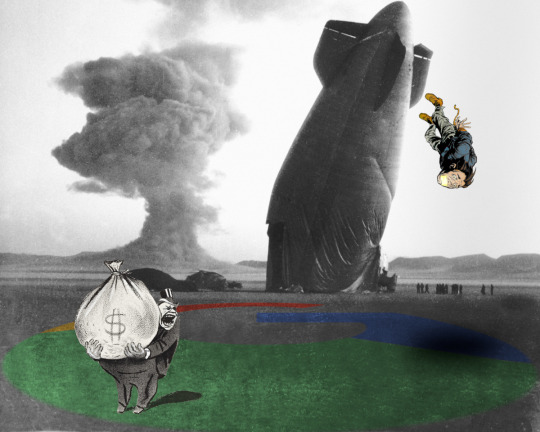
This Monday (November 27), I'm appearing at the Toronto Metro Reference Library with Facebook whistleblower Frances Haugen.
On November 29, I'm at NYC's Strand Books with my novel The Lost Cause, a solarpunk tale of hope and danger that Rebecca Solnit called "completely delightful."

This week, I wrote about how the Great Enshittening – in which all the digital services we rely on become unusable, extractive piles of shit – did not result from the decay of the morals of tech company leadership, but rather, from the collapse of the forces that discipline corporate wrongdoing:
https://locusmag.com/2023/11/commentary-by-cory-doctorow-dont-be-evil/
The failure to enforce competition law allowed a few companies to buy out their rivals, or sell goods below cost until their rivals collapsed, or bribe key parts of their supply chain not to allow rivals to participate:
https://www.engadget.com/google-reportedly-pays-apple-36-percent-of-ad-search-revenues-from-safari-191730783.html
The resulting concentration of the tech sector meant that the surviving firms were stupendously wealthy, and cozy enough that they could agree on a common legislative agenda. That regulatory capture has allowed tech companies to violate labor, privacy and consumer protection laws by arguing that the law doesn't apply when you use an app to violate it:
https://pluralistic.net/2023/04/12/algorithmic-wage-discrimination/#fishers-of-men
But the regulatory capture isn't just about preventing regulation: it's also about creating regulation – laws that make it illegal to reverse-engineer, scrape, and otherwise mod, hack or reconfigure existing services to claw back value that has been taken away from users and business customers. This gives rise to Jay Freeman's perfectly named doctrine of "felony contempt of business-model," in which it is illegal to use your own property in ways that anger the shareholders of the company that sold it to you:
https://pluralistic.net/2023/11/09/lead-me-not-into-temptation/#chamberlain
Undisciplined by the threat of competition, regulation, or unilateral modification by users, companies are free to enshittify their products. But what does that actually look like? I say that enshittification is always precipitated by a lost argument.
It starts when someone around a board-room table proposes doing something that's bad for users but good for the company. If the company faces the discipline of competition, regulation or self-help measures, then the workers who are disgusted by this course of action can say, "I think doing this would be gross, and what's more, it's going to make the company poorer," and so they win the argument.
But when you take away that discipline, the argument gets reduced to, "Don't do this because it would make me ashamed to work here, even though it will make the company richer." Money talks, bullshit walks. Let the enshittification begin!
https://pluralistic.net/2023/11/22/who-wins-the-argument/#corporations-are-people-my-friend
But why do workers care at all? That's where phrases like "don't be evil" come into the picture. Until very recently, tech workers participated in one of history's tightest labor markets, in which multiple companies with gigantic war-chests bid on their labor. Even low-level employees routinely fielded calls from recruiters who dangled offers of higher salaries and larger stock grants if they would jump ship for a company's rival.
Employers built "campuses" filled with lavish perks: massages, sports facilities, daycare, gourmet cafeterias. They offered workers generous benefit packages, including exotic health benefits like having your eggs frozen so you could delay fertility while offsetting the risks normally associated with conceiving at a later age.
But all of this was a transparent ruse: the business-case for free meals, gyms, dry-cleaning, catering and massages was to keep workers at their laptops for 10, 12, or even 16 hours per day. That egg-freezing perk wasn't about helping workers plan their families: it was about thumbing the scales in favor of working through your entire twenties and thirties without taking any parental leave.
In other words, tech employers valued their employees as a means to an end: they wanted to get the best geeks on the payroll and then work them like government mules. The perks and pay weren't the result of comradeship between management and labor: they were the result of the discipline of competition for labor.
This wasn't really a secret, of course. Big Tech workers are split into two camps: blue badges (salaried employees) and green badges (contractors). Whenever there is a slack labor market for a specific job or skill, it is converted from a blue badge job to a green badge job. Green badges don't get the food or the massages or the kombucha. They don't get stock or daycare. They don't get to freeze their eggs. They also work long hours, but they are incentivized by the fear of poverty.
Tech giants went to great lengths to shield blue badges from green badges – at some Google campuses, these workforces actually used different entrances and worked in different facilities or on different floors. Sometimes, green badge working hours would be staggered so that the armies of ragged clickworkers would not be lined up to badge in when their social betters swanned off the luxury bus and into their airy adult kindergartens.
But Big Tech worked hard to convince those blue badges that they were truly valued. Companies hosted regular town halls where employees could ask impertinent questions of their CEOs. They maintained freewheeling internal social media sites where techies could rail against corporate foolishness and make Dilbert references.
And they came up with mottoes.
Apple told its employees it was a sound environmental steward that cared about privacy. Apple also deliberately turned old devices into e-waste by shredding them to ensure that they wouldn't be repaired and compete with new devices:
https://pluralistic.net/2023/09/22/vin-locking/#thought-differently
And even as they were blocking Facebook's surveillance tools, they quietly built their own nonconsensual mass surveillance program and lied to customers about it:
https://pluralistic.net/2022/11/14/luxury-surveillance/#liar-liar
Facebook told employees they were on a "mission to connect every person in the world," but instead deliberately sowed discontent among its users and trapped them in silos that meant that anyone who left Facebook lost all their friends:
https://www.eff.org/deeplinks/2021/08/facebooks-secret-war-switching-costs
And Google promised its employees that they would not "be evil" if they worked at Google. For many googlers, that mattered. They wanted to do something good with their lives, and they had a choice about who they would work for. What's more, they did make things that were good. At their high points, Google Maps, Google Mail, and of course, Google Search were incredible.
My own life was totally transformed by Maps: I have very poor spatial sense, need to actually stop and think to tell my right from my left, and I spent more of my life at least a little lost and often very lost. Google Maps is the cognitive prosthesis I needed to become someone who can go anywhere. I'm profoundly grateful to the people who built that service.
There's a name for phenomenon in which you care so much about your job that you endure poor conditions and abuse: it's called "vocational awe," as coined by Fobazi Ettarh:
https://www.inthelibrarywiththeleadpipe.org/2018/vocational-awe/
Ettarh uses the term to apply to traditionally low-waged workers like librarians, teachers and nurses. In our book Chokepoint Capitalism, Rebecca Giblin and I talked about how it applies to artists and other creative workers, too:
https://chokepointcapitalism.com/
But vocational awe is also omnipresent in tech. The grandiose claims to be on a mission to make the world a better place are not just puffery – they're a vital means of motivating workers who can easily quit their jobs and find a new one to put in 16-hour days. The massages and kombucha and egg-freezing are not framed as perks, but as logistical supports, provided so that techies on an important mission can pursue a shared social goal without being distracted by their balky, inconvenient meatsuits.
Steve Jobs was a master of instilling vocational awe. He was full of aphorisms like "we're here to make a dent in the universe, otherwise why even be here?" Or his infamous line to John Sculley, whom he lured away from Pepsi: "Do you want to sell sugar water for the rest of your life or come with me and change the world?"
Vocational awe cuts both ways. If your workforce actually believes in all that high-minded stuff, if they actually sacrifice their health, family lives and self-care to further the mission, they will defend it. That brings me back to enshittification, and the argument: "If we do this bad thing to the product I work on, it will make me hate myself."
The decline in market discipline for large tech companies has been accompanied by a decline in labor discipline, as the market for technical work grew less and less competitive. Since the dotcom collapse, the ability of tech giants to starve new entrants of market oxygen has shrunk techies' dreams.
Tech workers once dreamed of working for a big, unwieldy firm for a few years before setting out on their own to topple it with a startup. Then, the dream shrank: work for that big, clumsy firm for a few years, then do a fake startup that makes a fake product that is acquihired by your old employer, as an incredibly inefficient and roundabout way to get a raise and a bonus.
Then the dream shrank again: work for a big, ugly firm for life, but get those perks, the massages and the kombucha and the stock options and the gourmet cafeteria and the egg-freezing. Then it shrank again: work for Google for a while, but then get laid off along with 12,000 co-workers, just months after the company does a stock buyback that would cover all those salaries for the next 27 years:
https://pluralistic.net/2023/09/10/the-proletarianization-of-tech-workers/
Tech workers' power was fundamentally individual. In a tight labor market, tech workers could personally stand up to their bosses. They got "workplace democracy" by mouthing off at town hall meetings. They didn't have a union, and they thought they didn't need one. Of course, they did need one, because there were limits to individual power, even for the most in-demand workers, especially when it came to ghastly, long-running sexual abuse from high-ranking executives:
https://www.nytimes.com/2018/10/25/technology/google-sexual-harassment-andy-rubin.html
Today, atomized tech workers who are ordered to enshittify the products they take pride in are losing the argument. Workers who put in long hours, missed funerals and school plays and little league games and anniversaries and family vacations are being ordered to flush that sacrifice down the toilet to grind out a few basis points towards a KPI.
It's a form of moral injury, and it's palpable in the first-person accounts of former workers who've exited these large firms or the entire field. The viral "Reflecting on 18 years at Google," written by Ian Hixie, vibrates with it:
https://ln.hixie.ch/?start=1700627373
Hixie describes the sense of mission he brought to his job, the workplace democracy he experienced as employees' views were both solicited and heeded. He describes the positive contributions he was able to make to a commons of technical standards that rippled out beyond Google – and then, he says, "Google's culture eroded":
Decisions went from being made for the benefit of users, to the benefit of Google, to the benefit of whoever was making the decision.
In other words, techies started losing the argument. Layoffs weakened worker power – not just to defend their own interest, but to defend the users interests. Worker power is always about more than workers – think of how the 2019 LA teachers' strike won greenspace for every school, a ban on immigration sweeps of students' parents at the school gates and other community benefits:
https://pluralistic.net/2023/04/23/a-collective-bargain/
Hixie attributes the changes to a change in leadership, but I respectfully disagree. Hixie points to the original shareholder letter from the Google founders, in which they informed investors contemplating their IPO that they were retaining a controlling interest in the company's governance so that they could ignore their shareholders' priorities in favor of a vision of Google as a positive force in the world:
https://abc.xyz/investor/founders-letters/ipo-letter/
Hixie says that the leadership that succeeded the founders lost sight of this vision – but the whole point of that letter is that the founders never fully ceded control to subsequent executive teams. Yes, those executive teams were accountable to the shareholders, but the largest block of voting shares were retained by the founders.
I don't think the enshittification of Google was due to a change in leadership – I think it was due to a change in discipline, the discipline imposed by competition, regulation and the threat of self-help measures. Take ads: when Google had to contend with one-click adblocker installation, it had to constantly balance the risk of making users so fed up that they googled "how do I block ads?" and then never saw another ad ever again.
But once Google seized the majority of the mobile market, it was able to funnel users into apps, and reverse-engineering an app is a felony (felony contempt of business-model) under Section 1201 of the Digital Millennium Copyright Act. An app is just a web-page wrapped in enough IP to make it a crime to install an ad-blocker.
And as Google acquired control over the browser market, it was likewise able to reduce the self-help measures available to browser users who found ads sufficiently obnoxious to trigger googling "how do I block ads?" The apotheosis of this is the yearslong campaign to block adblockers in Chrome, which the company has sworn it will finally do this coming June:
https://www.tumblr.com/tevruden/734352367416410112/you-have-until-june-to-dump-chrome
My contention here is not that Google's enshittification was precipitated by a change in personnel via the promotion of managers who have shitty ideas. Google's enshittification was precipitated by a change in discipline, as the negative consequences of heeding those shitty ideas were abolished thanks to monopoly.
This is bad news for people like me, who rely on services like Google Maps as cognitive prostheses. Elizabeth Laraki, one of the original Google Maps designers, has published a scorching critique of the latest GMaps design:
https://twitter.com/elizlaraki/status/1727351922254852182
Laraki calls out numerous enshittificatory design-choices that have left Maps screens covered in "crud" – multiple revenue-maximizing elements that come at the expense of usability, shifting value from users to Google.
What Laraki doesn't say is that these UI elements are auctioned off to merchants, which means that the business that gives Google the most money gets the greatest prominence in Maps, even if it's not the best merchant. That's a recurring motif in enshittified tech platforms, most notoriously Amazon, which makes $31b/year auctioning off top search placement to companies whose products aren't relevant enough to your query to command that position on their own:
https://pluralistic.net/2023/04/25/greedflation/#commissar-bezos
Enshittification begets enshittification. To succeed on Amazon, you must divert funds from product quality to auction placement, which means that the top results are the worst products:
https://pluralistic.net/2023/11/06/attention-rents/#consumer-welfare-queens
The exception is searches for Apple products: Apple and Amazon have a cozy arrangement that means that searches for Apple products are a timewarp back to the pre-enshittification Amazon, when the company worried enough about losing your business to heed the employees who objected to sacrificing search quality as part of a merchant extortion racket:
https://www.businessinsider.com/amazon-gives-apple-special-treatment-while-others-suffer-junk-ads-2023-11
Not every tech worker is a tech bro, in other words. Many workers care deeply about making your life better. But the microeconomics of the boardroom in a monopolized tech sector rewards the worst people and continuously promotes them. Forget the Peter Principle: tech is ruled by the Sam Principle.
As OpenAI went through four CEOs in a single week, lots of commentators remarked on Sam Altman's rise and fall and rise, but I only found one commentator who really had Altman's number. Writing in Today in Tabs, Rusty Foster nailed Altman to the wall:
https://www.todayintabs.com/p/defective-accelerationism
Altman's history goes like this: first, he founded a useless startup that raised $30m, only to be acquired and shuttered. Then Altman got a job running Y Combinator, where he somehow failed at taking huge tranches of equity from "every Stanford dropout with an idea for software to replace something Mommy used to do." After that, he founded OpenAI, a company that he claims to believe presents an existential risk to the entire human risk – which he structured so incompetently that he was then forced out of it.
His reward for this string of farcical, mounting failures? He was put back in charge of the company he mis-structured despite his claimed belief that it will destroy the human race if not properly managed.
Altman's been around for a long time. He founded his startup in 2005. There've always been Sams – of both the Bankman-Fried varietal and the Altman genus – in tech. But they didn't get to run amok. They were disciplined by their competitors, regulators, users and workers. The collapse of competition led to an across-the-board collapse in all of those forms of discipline, revealing the executives for the mediocre sociopaths they always were, and exposing tech workers' vocational awe for the shabby trick it was from the start.

If you'd like an essay-formatted version of this post to read or share, here's a link to it on pluralistic.net, my surveillance-free, ad-free, tracker-free blog:
https://pluralistic.net/2023/11/25/moral-injury/#enshittification
#pluralistic#moral injury#enshittification#worker power#google#dont be evil#monopoly#sam altman#openai#vocational awe#making a dent in the universe
557 notes
·
View notes
Text
Love is Stored in the Cat: A Nepeta Leijon Character Study
I guess these are a series now! I also have a request for Feferi in my inbox that I'll get around to eventually.
SO! Dear, sweet Nepeta.
Nepeta is the troll that is most against the existence of the hemocaste.
I believe the Ultimate Self speech was originally going to be from her, not Davepetasprite^2.
She's bad at shipping.
These all make her extremely impurrtant!!!
So furst of all, I'm going to start with the same disclaimer as my Eridan essay (go read that first!!! It sets up a lot of ideas that I'm expanding on here), which is that the things Hussie says are going to be lowered in value, because he likes to play coy about plot stuff. I'm also not counting anything but the actual text as canon, and even with in that text, I'm counting everything after GAME OVER as soft canon - a suggestion of what would have been, often truncated for time, often a deliberate middle finger to the shitty fandom.
Okay, so with that squared away!
Nepeta Says Fuck The Hemocaste
I'm not going to bother doing a deep dive on Nepeta's characterization, because fur the most part, I think the fandom more or less gets her right - she wears her heart (h33h33) on her sl33ve, after all! She's a very sweet little catgirl who loves roleplay and shipping, who is also a vicious hunter of wild beasts and lives in a cave. She's very nice and friendly, but has a tough streak and a spine.
She also says fuck the hemocaste, why does that even exist:
CT: D --> Your fraternization with the base classes have 100sened your morals, can't you see this
AC: :33 < no! i dont care, they are fun
AC: :33 < and i dont know anything about classes or bases or blood color, it doesn't matter!
AC: :33 < what does gr33n blood even mean! it doesnt mean anything to me and it shouldnt mean anything to anyone else!
This is a radical stance not outright shared by any of the other trolls. Aradia calls highbloods "hateful sn0bs" that she and Tavros shouldn't have "ever had anything t0 d0 with", the highbloods are, of course, all casteist to varying degrees, and even Karkat seems fairly accepting of the class divide, at one point taunting Vriska that her rejection from the blue team is "ANOTHER INFURIATING VICTORY FOR GUTTER BLOOD OVER ARISTOCRACY". Not to mention his long-held dream of becoming a threshecutioner.
Even Feferi, despite saying to Eridan that "W-E AR-E NOT B-ETT-ER T)(AN ANYBODY!!!!!", is actually perfectly comfortable with the caste system's existence, comparing having to stop using her royal typing quirk to "peasant-IFICATING" herself - and let's not forget that a Beforus under her rule had its caste system 100% intact.
This means that Nepeta is the ONLY troll who has said, in no uncertain terms, that the caste system should not exist. It's stupid, it's bad, and it doesn't meowtter!
AND SHE'S RIGHT.
But she's never able to fully express this opinion, which brings us to:
A COMPLICKATED RELATIONSHIP WITH EQUIUS
Now, before I say anything, I must insist that I do believe these two work as good moirails. That does not, however, stop them from being 13, and therefore, being poor to each other the way 13-year-olds sometimes are. I don't think they should break up; I think they should re-examine certain dynamics, and I think they need some space to breathe apart from each other.
Equius has a lot of problems, which I won't get into overmuch here, because... that's a whole essay on its own (are you people seeing a trend yet). But with regards to Nepeta specifically, he's extremely controlling and protective, to the point where she's a little scared of him before the game begins:
AC: :33 < well it does sound like it will be a lot of fun but i think i should get purrmission first
GC: BL4R!!!!!
GC: TH4TS SO STUP1D
GC: H3S NOT TH3 BOSS OF YOU
AC: :33 < i know!
AC: :33 < but still im kind of scared of him and i think purrhaps its best to just run it by him first so there isnt a kerfuffle about it or anything
She's also afraid to tell him about her crush on Karkat, since she knows he doesn't like Karkat:
AC: :33 < well
AC: :33 < i have never told anybody this not even my moirail
AC: :33 < heh, actually hes the LAST guy i might tell, he so wouldnt appurrve X33
AC: :33 < but yes i have liked somebody for quite some time, but alas he doesnt know it
By the time they end their game, she's gotten over this fear, seeing as she spends many hours curled up with Equius in a pile of robotics parts, but it still must be noted that they have some issues in their relationship that were never resolved, primarily on Equius's end. What this means for Nepeta, however, is that in addition to setting her up as the most outright anti-classism troll, the comic sets her up to be socially isolated due to her moirail's paranoia about letting her associate with both lowbloods (seeing them as bad influences) OR other highbloods, seeing them as dangerous.
He's not entirely wrong - his refusal to allow her to participate in FLARP kept her from winding up entangled in the horrible chain of revenge, as Tavros alludes:
AT: iT'S PROBABLY FOR THE BEST,
AT: tHAT YOU LISTEN TO HIM,
AC: :33 < i dont know
AC: :33 < you think so?
AT: wELL,
AT: iF YOU DIDN'T LISTEN TO HIM BEFORE,
AT: yOU MIGHT HAVE PLAYED GAMES WITH US BEFORE,
AT: aND SOMETHING BAD MIGHT HAVE HAPPENED TO YOU,
AC: :33 < hmm purrhaps
But he's still wrong. And it's probably an uncontrolled manifestation of his Heir of Void abilities - he's both consciously and unconsciously hiding her from other people.
This isn't to say she doesn't stand up for herself! Many of her discussions with Equius are pseudo-arguments, and she does get her way often enough, managing to get him to roleplay with her, and managing to get him back in the roboti% pile to talk about his feelings about Aradia. She also talks to the humans explicitly against Equius's orders, although she's keeping it a sneakret from him:
NEPETA: :33 < but equius already furbid me from doing that :((
NEPETA: :33 < not that i am listening to him, but shhhhh! :33
KARKAT: WAIT, HE DID?
KARKAT: OK, THEN AS YOUR LEADER I ORDER YOU TO RP WITH THEM AS MUCH AS POSSIBLE. BE AS OBNOXIOUS ABOUT IT AS YOU CAN.
NEPETA: :33 < yaaaaaaaaaaaaaaay!
But the fact that she has to tiptoe around him like this speaks to them having issues in their relationship that go unexamined and unresolved, especially since it's clear that Nepeta really would like to be friends with more people, were Equius not getting in her way. So, even though I do think they are good moirails for each other - they clearly genuinely, deeply care about one another. But they could use some relationship counselling.
In fact, Jasprosesprite^2 outright calls her lonely:
JASPROSESPRITE^2: Or the girl who likes ships! Cause they made her less lonely. ;3
So, she's anti-hemocaste and lonely, two character traits that were set up and never resolved. And beclaws this is Nepeta, in her honor, I'm going to talk about a third:
Her Unrequited Crush On Karcat
She has the BIGGEST flushed crush on Karkat. It's seen on her shipping wall twice, once with the word OTP on it.
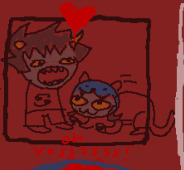

And, despite never discussing it with her moirail, Nepeta mentions it once to Jaspersprite, and once to Jasprosesprite^2.
Now, I'm not really here to debate on the validity of KatNep - I think it's fine, even if I don't personally ship it, and don't personally think it would work out (there are lots of indications that they wouldn't work out, including Jasprosesprite^2 outright saying so). However, her crush on Karkat is both complicated and creates some interesting setups for her character. I am going to discuss it fairly critically either way, so KatNep shippers have been warned.
A lot of her feelings about Karkat - and about shipping in general - wind up being heavily interlinked with her status as a Hero of Heart, so I'm going to expand on it more there. But what I will note in this section is the fact that, despite Nepeta insisting twice that she doesn't think Karkat knows about her crush on her:
NEPETASPRITE: :33 < it was karkat
NEPETASPRITE: :33 < but i never told him and im pretty sure he never found out how i felt!
He tooootally did:
KARKAT: OK, BUT TO BE FAIR, I'M PRETTY SURE SHE'S STILL OBSESSED WITH ME.
KARKAT: IT'S A VERY UNFORTUNATE, VERY RED AND VERY UNREQUITED SITUATION I'VE BEEN TRYING TO TIPTOE AROUND FOR A LONG TIME, OK?
Interpret that how you will for shipping purposes, but I want to propose that this is a reflection of their statuses as Heart and Blood players. Heart, despite its players' obsessions with romance, is not the romance aspect, Blood is. Karkat displays this very same romantic acumen when he tells Dave that he's known Terezi and Gamzee were a thing for a long time, despite everyone else on the meteor trying to keep it a secret from him. Heart is, instead, about identity, feelings, motivations, souls, and self. In other words:
Nepeta Is Kind Of Bad At Shipping

Let's take a look at those shipping walls.
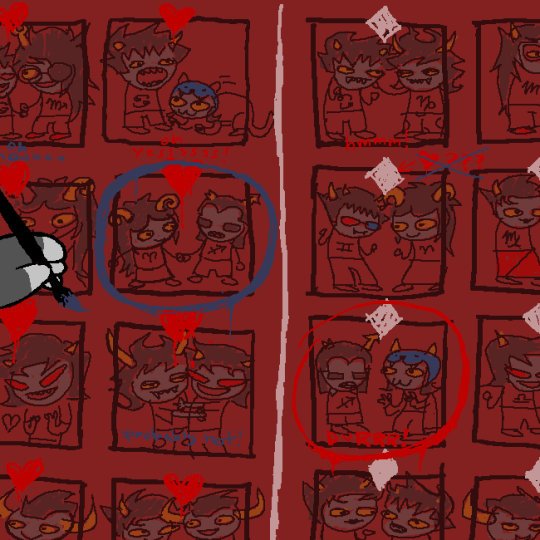


Let's break this down a little. Nepeta's ships are not entirely wrong, but even the successful ones are kind of wrong. Here's what I mean. We've already discussed how Equius and Nepeta's moirallegiance has some... issues in it. If we go down her list of ships that actually do happen, most of them have some issues in them!
Aradia expresses her regret for getting together with Equius in the Ministrife. Kanaya and Rose suffer some major relationship problems when Rose starts drinking, to the point Karkat feels a need to step in as an auspice. Karkat and Gamzee fail, as Karkat is not calmed by Gamzee, and Gamzee stops listening to Karkat. And while Sollux and Feferi seem to be fairly healthy, after they both wind up in the Furthest Ring, he's pretty much always next to Aradia - he and Feferi don't even get to exchange words with each other once they're in the Furthest Ring. Purrsonally, I think he and Feferi are meant to end up as moirails, but shhhh.
So what's happening here? Well, this goes back to her identity as a Heart player. Heart is concerned with feelings and motivations.
They simply want to understand the one thing we all are stuck with for our entire lives, i.e. our own minds. Forging an identity is extremely important to the Heart-bound, and every decision and action goes toward building a coherent narrative of their own story. That isn't to say Heart-bound don't care deeply for their friends and allies; they just have a tendency to assume that everyone is as concerned with identity as they are.
Nepeta's shipping has also been associated with her isolation and loneliness. When you put this together, it implies that Nepeta's shipping is about her desire to understand others, and much of her ships are based on one of the parties having feelings, regardless of compatibility, feasibility, or broader implications. After all, despite the fact that she has pretty terrible romantic acumen, she IS able to instinctively identify that Eridan's advances toward her were insincere:
NEPETASPRITE: :33 < well ok i guess eridan hit on me a few times
NEPETASPRITE: :33 < but his advances always struck me as cr33py and insincere
And that Karkat secretly LOVES and RESPECTS his friends:
JASPROSESPRITE^2: On the contrary Nepeta. You deserve someone who will RESPECT and ADORE you.
NEPETASPRITE: :33 < well... yes
NEPETASPRITE: :33 < i always hoped to find someone like that some day
NEPETASPRITE: :33 < i dunno maybe youre right but in spite of whatever problems he might have i always felt like i saw something in him that made me think he could be that purrson!
Or knowing that Equius loves to play games, and still feels sad about Aradia exploding:
AC: :33 < i s33 right through your stupid act, who are you trying to kid!
AC: :33 < look how you go out of your way to use words that have x's in them so that you can use your silly purrcent signs
AC: :33 < or use these absurd words that you can shoehorn a '100' into, even if its not strictly replacing 'loo'!!!
AC: :33 < you are so transpurrent
AC: :33 < i can tell you like to play games, d33p down you are a guy who likes to play games!
AC: :33 < i can smell a guy who likes to play games from so fur away with this nose, you have no idea X33
NEPETA: :33 < she was so happy, just like she used to be, and she said she would s33 you soon!
EQUIUS: D --> That's a nice thought, and thank you for sharing it
EQUIUS: D --> But it was only a dream, and will surely have no consequence in reality
NEPETA: :33 < equius?
NEPETA: :33 < are those f33lings i an detecting with my wiggly whiskery nose?
EQUIUS: D --> Maybe
Because feelings, and not relationships, are her actual domain.
And speaking of Heart powers...
Nepeta and the Ultimate Self
So from this point forward, I'm going to assume you're more or less agreeing with my take that at some point after Game Over, Hussie - for whatever reason - gave up on his original ending, and wound up truncating his ideas so he could finish the comic faster. I go more into detail about that here.
So, in this hypothetical original ending, I firmly believe that the speech about the Ultimate Self would have come from Nepeta. First, let's take a look at what the "Ultimate Self" entails, as it appears within the comic:
DAVEPETASPRITE^2: B33 < everything that ever happens to every version of you is an important part of your ultimate self... like a superceding bodyless and timeless persona that crosses the boundaries of paradox space and unlike god tiers or bubble ghosts or whatever, it really IS immortal
DAVEPETASPRITE^2: B33 < but in your physical form there are all these partitions in your mind that prevent you from remembering any of that which makes your existence f33l totally linear
DAVEPETASPRITE^2: B33 < which is probably for the best!
DAVEPETASPRITE^2: B33 < in a regular body s33ing all that would be too overwhelming
...
DAVEPETASPRITE^2: B33 < and after it sinks in for a while you start coming to this understanding of a greater self
DAVEPETASPRITE^2: B33 < maybe i "got it" quicker though because of the two people i was and their aspects
DAVEPETASPRITE^2: B33 < understanding heart is all about the nuances of a distributed self
DAVEPETASPRITE^2: B33 < nepeta never got to make much headway with her aspect but shes finally gettin the chance
DAVEPETASPRITE^2: B33 < the time aspect is all about running into different versions of yourself so you kinda get confronted with it in a really literal way that can be disturbing
DAVEPETASPRITE^2: B33 < obviously davesprite stuggled with that too, but now its fine
DAVEPETASPRITE^2: B33 < hes fr33 from worrying about it all and what it means for his place in reality
DAVEPETASPRITE^2: B33 < because he can s33 now all his selves have relevance in painting the full picture of who he truly is
DAVEPETASPRITE^2: B33 < im not COMPLETELY sure because im not like some sort of ASPECT MASTER but
DAVEPETASPRITE^2: B33 < my avian slash feline intuition tells me that all roads will lead you here eventually
DAVEPETASPRITE^2: B33 < gaining the d33pest possible understanding of any aspect will bring you to the same final conclusion about your ultimate self
Now, I believe - and I hope you'll agree - that it's kind of lame, narratively, for Davesprite to have been set up with so much angst about not being the "real Dave," and for Nepeta to have all her issues with loneliness and shyness, and for these two specific iterations of each other to have never interacted, but suddenly getting double-prototyped fixes all of their problems, and they achieve Ultimate Selfhood despite being two total strangers to each other. So let's instead break down the more salient points about what Ultimate Selfhood entails, divorced from the fact that it's Davepetasprite^2 doing the narrating:
Every player in the game possesses an "Ultimate Self," an ultimate culmination of all their experiences and memories, specifically referred to as a "persona"
Normally, people are not aware of this, because it would be too overwhelming to deal with so many memories and iterations of each other.
Everyone will achieve Ultimate Selfhood eventually as the final culmination of their understanding of their aspect.
Heart is all about the nuances of a distributed self.
Let's talk about that last one some more, and by that I mean, let's see what Calliope has to say about it:
TT: I don't know why it had to be this way for me. Juggling these two waking selves at once.
TT: I guess I'm used to it, but it still makes for a pretty intense existence.
TT: Do you even know what the deal with that is? Like is there any precedent in your readings?
UU: i don't know aboUt precedent, bUt it makes plenty of sense to me as the type of path one might expect for a hero of heart.
UU: a path rUled by the heart aspect can be a joUrney of splintered self.
UU: that is, the player's being may exhibit the same kind of fragmentation which certain classes coUld caUse in others.
UU: i think this is what has triggered yoUr dUal-awareness between waking and dream selves, thoUgh it woUld not sUrprise me if the symptoms manifested in even more ways than this.
Now, Dirk has a clawmplicated relationship with his alternate selves, given that he's a Prince, but Nepeta wouldn't have the same struggles, or at least, not to the same degree. The problem is, hampered by Equius and her own shyness about discussing her thoughts and feelings with others:
NEPETASPRITE: :33 < i get so shy and worried what people might think of me if i say how i f33l
NEPETASPRITE: :33 < im always so scared that they wont f33l the same way or just think im stupid or pathetic or something
She never actually gets to explore this part of herself.
But What If... She Did?
The way I imagine the original ending going is that each troll that gets saved by John's interference in the timeline then asks John to help them fix their own mistakes, thereby saving somebody else. Each successive trip through the meteor brings new character development, and also riddles the comic with progressively more password pages, which I think would be really funny. And throughout all this the Game Over team is searching for Vriska, Meenah, and the treasure, and resolving their arcs that way, so it's not like they would be replaced - they're the ones who get to kill LE. The process, in my mind, goes like this:
Terezi asks John to save Vriska, and prevent her from getting too spades with Gamzee, as these are her two greatest regrets.
Vriska obviously had great regrets about killing Tavros, both pre- and post-retcon, so she asks for his death to be prevented.
Tavros staying alive means that he and Gamzee wind up hashing out some stuff - Gamzee mentions that he feels "So aT ChIlL WiTh yOu" while talking to Tavros, and Tavros reciprocates the friendship and also - interestingly - acknowledges Gamzee's religion, calling it beautiful even if he doesn't necessarily believe in it. This is interesting because Karkat's inability to do so is explicitly one of the reasons their moirallegiance broke down. So having Tavros back, alive, means that he and Gamzee would likely end up in some sort of relationship, probably pale despite flushed leanings, and would bring Gamzee back into the fold.
Gamzee would then be like, yeah, wow, that time I killed Nepeta and Equius was pretty bad, huh? Especially since his decision to hang onto his friends' bodies and prototype them is often interpreted as him genuinely feeling bad about his dead friends (he tells Kurloz to shut up when Kurloz mentions all the dead friends, and his religion seems to be about a paradise he wants to share with his friends anyway). So he'd ask John to prevent him from killing them, resulting in the two of them getting to live.
Things get much more hypothetical from here, since so much of the character dynamics would have changed, but I think by this point, Equius might command ask John to let him say goodbye to Aradiabot before she explodes, which he expresses feeling very sad about. However, in doing so, John and Aradiabot end up in the same room, and when she realizes that he has the ability to change the timeline without repercussions, she'd seize him by the arm and demand that he take her back in time, to before she died. After all, she expresses regrets about her reckless actions, and how she always felt like it was all one big setup.
She would take Aradia's place in the Vriska revenge chain, being once more freed of her robot chassis, and from there, would trick Doc Scratch and the Handmaiden into thinking everything was still going according to their designs. Meanwhile, Alive!Aradia would be hanging out at Equius's place, borrowing his void powers to avoid notice, coordinating a new timeline that keeps the beats of the original (too much deviation causes unpredictability, and an paradox'd timeline offshoot without John's direct interference would still become doomed), but allows them greater freedom and the ability to overcome the machinations of Doc Scratch and associates.
This would also prevent Sollux from becoming so self-loathing, since it's no longer "his fault" that Aradia dies, although he winds up in that hole again after Feferi gets killed. Now that his Aradia is alive, he wouldn't feel like he might as well stay in the bubbles because his closest companions are there, so he'd make it to the end, and would ask John to prevent Feferi's death.
Eridan still dies; he's so disconnected and isolated from all his friends that his course of actions is largely unaffected even by everybody else's timeline tweaks. But before Feferi can suggest bringing him back, Karkat would butt in.
The Friendship Troll should be the one to demand that ALL of their friends be revived, especially if they had everyone except only one guy, and Karkat and Eridan are heavily implied to be moirails anyway. The course of Karkat's fixes are so comprehensive, and primarily romance-based, that the end result of this final loop is everybody not only being alive, but god-tiered, with appropriate character development.
Now, where Nepeta's Heart powers would play into all of this is that she would start to notice something going on. After all, Heart players are sensitive to their splintered selves, and (Nepeta) is probably much closer to Nepeta than regular doomed timeline offshoots. As the loops continue, and Nepeta has more and more time to talk to people, and meets her dead alternate selves, and even meets (Nepeta), she starts to awaken to her Ultimate Self - to come into possession of alternate memories.
And if the Ultimate Self is a very soul-y kind of concept, such that Heart players have a natural advantage in coming to understand it, then isn't it a natural fit that a Rogue of Heart - one who steals from Heart or steals Heart for others - would be naturally inclined to share the wisdom of her alternate selves, and even the very concept of the Ultimate Self, with her friends?
Because the Ultimate Self is actually, in my opinion, a pretty good narrative device. It turns the sadness of the dead and doomed timelines into something littersweet instead, and makes it so any weirdness regarding time travel and not really knowing your friends anymore will eventually be resolved, even if off-screen.
It's not really narratively satisfying when Davepetasprite^2 suddenly comes into being and reaches enlightenment, but imagine if instead it's a post-character development Nepeta comforting Davesprite on his relevance, or Jade on her loneliness, or John on not really knowing these new post-retcon versions of his friends? It would feel a lot better, since in this hypothetical, she would have reached that point after on-screen character development. Being able to share her true self with her friends on the meteor - by necessity, since what else are they going to be doing for three years - leads to her finally being able to fulfill her role as a Rogue of Heart.
Also, at some point during these repeated meteor trips, she dates Karkat (whether that's successful or not, I'll leave to reader interpretation - you already know where I stand), fulfilling Jaspersprite's musing that she might only be able to date Karkat after she dies.
So that's two out of thr33 of her outstanding plot hooks resolved... okay. So, I try not to make these essays into ship propaganda, but hear me out:
Hate Is Stored In The FefNep
Okay, so, remember that thing about how Feferi is actually a huge casteist hypocrite? Well, let's also note that the comic, post-Murderstuck, seems to put Nepeta and Feferi together a lot - they're a Commodore and Rear Admiral in the ghost pirate army, respectively, and they also wind up as Fefetasprite. So I think it's not entirely out of left field to say that these two were implied to have SOMETHING going on.
And that something... is a difference in political views.
I mean, let's be real, there's a reason Fefetasprite is the most explode-prone after Tavrisprite. Miss "The Hemocaste is Stupid and Shouldn't Matter" vs. Miss "I Love Being A Princess And Call Jade Hornless and Finless (Derogatory)"? Come on, tell me you don't see it.
Without getting too much into Feferi, this hypocrisy, and unwillingness to check her privilege (so glad I found an excuse to use that term unironically), are probably her greatest character flaws - ie, the things you would expect the story to address about her. Meanwhile, one of Nepeta's flaws, which she laments to Jasproseprite^2, is that she feels too shy to talk about her feelings to other people, leading to her having never expressed her views on the hemocaste to anyone but Equius.
I think that they initially think they'd be friends. Each one of them would go "oh man, this other girl is soooo cute, I wish I could talk to her more often!"
And then, once they do, they realize they fucking hate each other. Nepeta would go "X00 < you are such a hypocrite who f33ls like youre better than all of us!!!" and Feferi would go "You're suc)( an uneducated glubbing P-EASANT! 3X0" and then they'd claw each others' eyes out. It would be so funny, and if a homestuck ship isn't extremely fucking funny, then why are we even here.
But more importantly, this would further them along into resolving each others' arcs - Feferi would be forced to grapple with the greater implications of classism, and Nepeta - who is shown having a spine the most in defiance of somebody else - would grow more aggressive about being open about her feelings in defiance of Feferi. Even Equius would get roped into it in a positive way - you can just imagine him going "D --> Can I really believe my auricular sponge clots D --> Nepeta, you are finally taking interest in politi%" and be 100% on board with teaching her so Feferi won't be able to call her uneducated.
And then for flushed, I dunno! Karkat's an option, and Jade and Jake also both love the fuck out of furries, and Tavros seems nice. But yeah I'll die on the fefnep hate ship. Guys it would be so funny.
Thank you as always for reading! Let me know if there's a troll you want to hear me ramble about next.
219 notes
·
View notes
Text
okay. let's talk about shin, sabine, and whatever the hell is going on here:
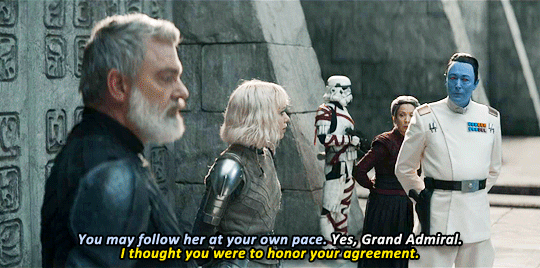
i've been trying to figure out this moment, and why shin responds like this. because it feels like a change, right? the shin of episode 1 would be thrilled to have permission to hunt down and kill sabine. but here, she's clearly protesting the order (indirectly, because she can hardly outright say 'no' to thrawn).
on one level, this is definitely at least in part because the order is coming from thrawn. orders from baylan are fine for shin: baylan is her master, and by this point in the series it's obvious how much she respects him. but thrawn? baylan told her finding thrawn would bring them power, but instead both she and baylan are being treated like his underlings - this is not what shin thought they were signing up for.
but if this were solely about thrawn giving orders, i'd expect shin's reaction to seem irritated or offended - she's hardly a stranger to anger, after all. but i think it's fair to say that shin's response here can be best characterised as alarmed? she's clearly surprised that they aren't letting sabine go, and more than that: she's not happy about it.
so then, i thought maybe that this was about honour - that shin was so disturbed by this, because it is dishonourable for baylan (who has made a point of insisting on keeping his word to sabine) to break their agreement. (and i know it may seem counterintuitive to assume that shin cares about such a jedi-like concept as honour, but judging by the way baylan speaks of the jedi and shin's padawan braid, he probably instilled her with their values if not their morals.) but then i remembered where episode four left off (which is indicated by the show to be a most a day or two ago):

this takes place literally immediately after sabine has made a deal with baylan. if shin cares enough about honour for it to override her hatred of sabine in episode six, it doesn't make sense for her to disregard honour (even in the heat of the moment) to try and kill sabine in episode four.
so if this isn't about thrawn (not entirely), and it isn't about honour (probably not at all), what is this about? what has changed to make shin go from homicidal obsession to protesting seemingly on sabine's behalf?
sabine, of course.
(by which i actually mean: shin.)
let's talk about The Look!

shin staring at sabine is nothing remotely new. shin staring at sabine without a homicidal glare or a mocking smirk? that's extremely new. this scene makes me crazy (i'm trying so so hard to keep the shipping goggles off and to be objective guys). it may not seem like much at first glance, but this is a dramatic change of behaviour for shin. she's looking at - no, observing sabine in a completely neutral and open way. there's no hostility in this gaze, no judgement, not even fear or conflict. just: observing. and she's doing so openly as well - not just that she isn't disguising herself - she turns to face sabine, as if to give sabine a better look at her. as if to let sabine observe her right back.
why??? why is shin doing this??
um. well. i actually don't know.
i can't make any remotely certain assumptions about what has changed since they left seatos. maybe shin has done a lot of introspection. maybe she feels like she's seen a different side of sabine. maybe they fucked on that spaceship.
the only conclusion i do feel it might be safe to make is this:
i don't think shin sees sabine as an enemy anymore.
i don't know when exactly that changed, i don't know what exactly caused it. but it's true. and if shin and sabine aren't enemies anymore - what are they to each other? what will they become?
tl;dr - shin doesn't want to murder sabine in cold blood anymore. also i think they should hold hands.
#wolfwren#um so this got long. like nearly 700 words long.#what can i say they make me crazy#shin hati#ahsoka series#sabine wren#star wars#baylan skoll#also i tried really hard to stay objective and focus only on what canon gives us#shipping and fanon are fun but sometimes the restrictions of canon are More fun#plus i wanted this to be more about character analysis than shipping fodder y'know?#*#100#ahsoka#*meta
415 notes
·
View notes
Text
What Is the Appeal of Sonadow?
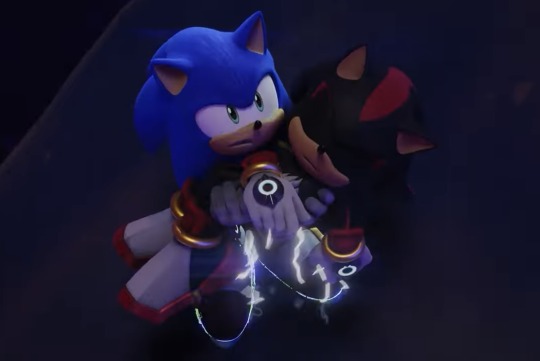
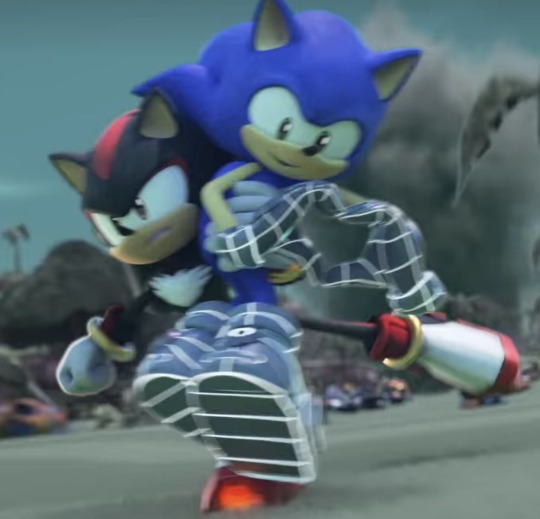
I have a lot of thoughts about this ship, what draws people to it, and why some of the criticisms of it are exaggerated or less than honest. Putting them under a cut because it’s gonna get long.
First of all, the critique of “Lol why do people ship them when they beat the shit out of each other whenever they disagree on something, they’re abusive!” is dishonest framing for two reasons. One is that it ignores the fact that Sonic and Shadow are allies far more often than they’re enemies, and even when they are enemies, it’s usually over something serious, not just a minor disagreement. The other is that it’s bad media criticism to apply real human standards to a cartoon animal universe.
When you watch the classic Looney Tunes short where Bugs and Daffy are arguing over whether it’s Rabbit Season or Duck Season and Bugs tricks Daffy into shooting himself, do you see Bugs as abusive and evil? Probably not, because the laws of physics don’t apply in cartoons and Daffy getting shot in the face doesn’t actually hurt him. He’s still completely fine afterwards because he’s a cartoon and is therefore invincible. The same is true for Sonic and Shadow. Have you ever seen either of them seriously injured after one of their fights? Has either one ever needed to go to the hospital because the other beat him up so badly? No, of course not. They groan in pain for about two seconds and then they’re fine. If the creators wanted to convey them being injured, they could show bruises or blood or have bones snapping and the characters limping, but they don’t. The fights are never meant to be taken that seriously. I find this criticism every bit as annoying and overzealous as people who insist that Pinky and the Brain are abusive because Brain bops Pinky on the head. They’re cartoons, y’all. They’re not realistic, were never meant to be realistic, and shouldn’t be treated as realistic. Different standards apply.
To the second point, Sonic and Shadow don’t actually fight that often. In all the interactions they’ve had together, it’s only been a handful of times. They’re allies in the Archie comics, Sonic ‘06, the canon ending of Shadow the Hedgehog (they’re only enemies in that game if the player wants them to be), Sonic Forces, Team Sonic Racing, The Murder of Sonic the Hedgehog, and most of the IDW comics, along with the endings of Sonic X, Sonic Adventure 2, and Sonic Heroes. They’re allies for much of Prime as well. But hey, let’s break down the times they do fight:
Sonic Adventure 2: Shadow’s memories have been tampered with and he and Sonic are literally fighting over the fate of the world.
Sonic X: Same thing for season 2, and in season 3, they’re fighting over whether Cosmo should live or die. Sonic says killing her is wrong, Shadow says stopping the Metarex is what’s most important and if that means little Cosmo has to die, well, them’s the breaks, pal.
Sonic Prime: Sonic has broken their world, Shadow is trying desperately to save it, and Sonic is valuing the Shatterverse inhabitants over Green Hill.
IDW: Shadow says Eggman is too dangerous to leave alive and if that means Mr. Tinker has to die too, well, them’s the breaks, pal. Sonic says killing anyone is wrong no matter the reason.
You see a pattern here? Most of the time what they fight over is literally life and death. They’re not going at each other’s throats over petty bullshit like who gets the last slice of pizza or who gets to pick the film for Movie Night. They fight over serious moral differences. I would argue that Amy and Knuckles have gotten angry at Sonic for way less than what Shadow does.
Now, there are a few instances where their fights are stupid, namely Sonic Boom and Sonic Heroes. But I think it’s pretty universally agreed that Shadow is out of character in Boom, and honestly, all of the fights in Sonic Heroes are very forced. There was no reason for Team Dark or Team Rose to fight Team Chaotix; their goals don’t contradict each other in any way and it’s clearly just manufactured conflict to give the player another boss fight. And these are the exception; most of their fights are over serious ideological divides.
Those serious ideological divides are exactly what makes Sonadow so interesting. I personally prefer ships where characters can learn and grow from each other, where their differences can clash until they learn to reconcile them. I don’t find a ship like, say, Sonamy nearly as interesting because I don’t think there’s many (if any) moral stances Sonic would have that Amy wouldn’t. They already agree on the important things. I’m not bashing anyone who likes that ship; if that’s your thing, good for you. It just doesn’t appeal to me because I think Sonic and Amy already having a lot in common morally means they can’t really grow and change from interacting with each other in the same way.
Sonic can bring out the best in Shadow, teach him to trust others and lighten up and learn how to live in the moment rather than being tethered to the past. Shadow can teach Sonic how to think before he acts, to view the world more realistically, and to consider the impact that his insistence on moral purity will have on others. That setup makes for some amazing stories.
Also? These guys love fighting each other. They’re both athletes and very competitive. Look at how much they smile when they fight:
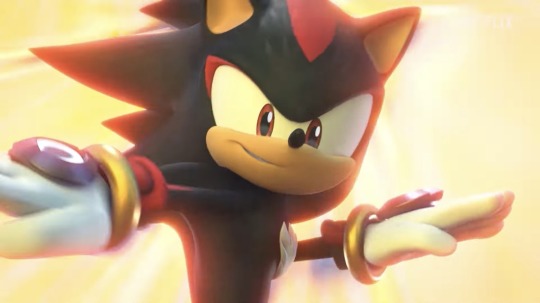
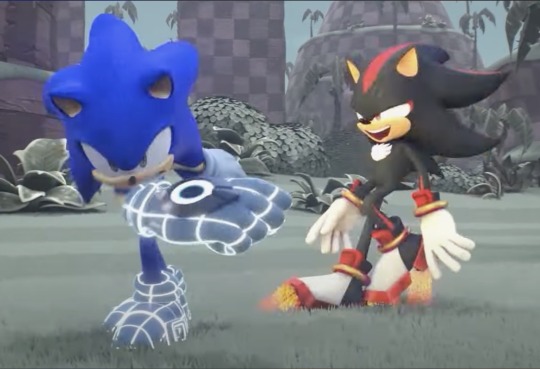
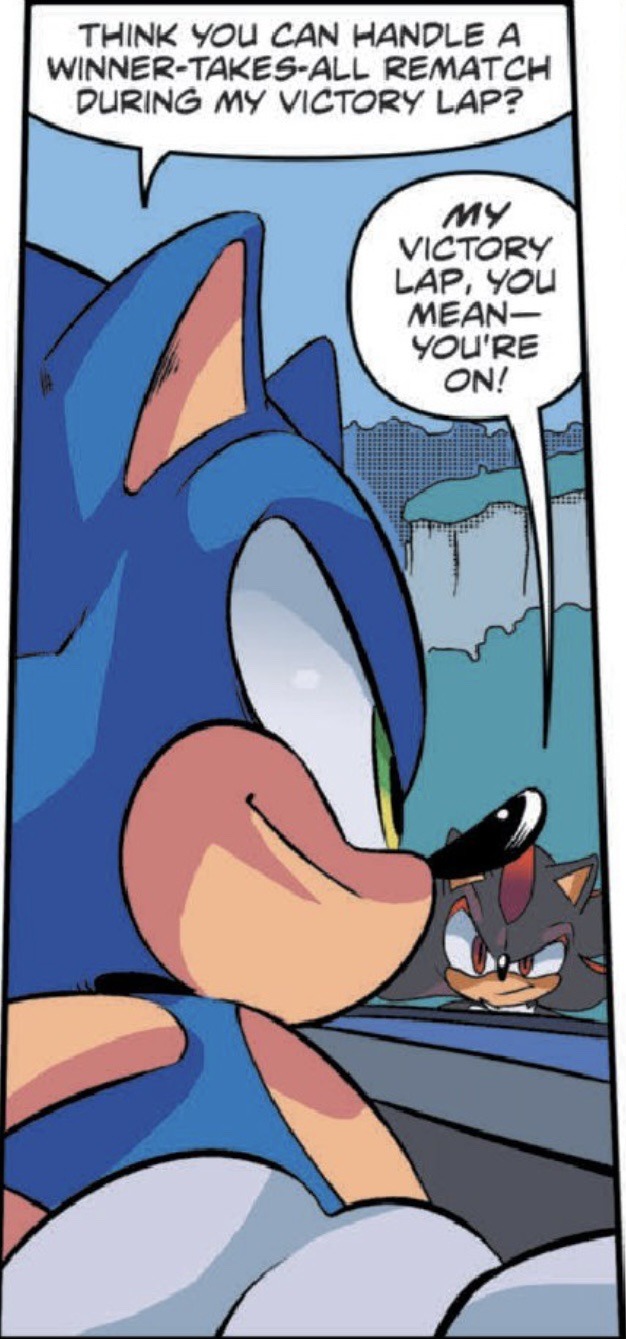
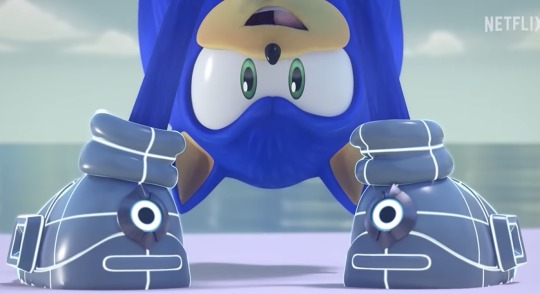


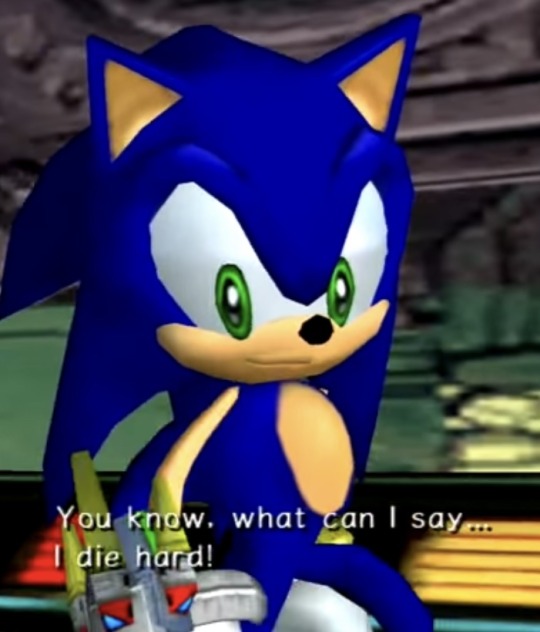
Like…they love this. It’s so much fun for them. Sonic and Shadow are both competitive athletes who love pushing themselves, but in terms of speed, no one is any competition for them except each other. No one else can beat either of them in a race. Imagine spending your whole life winning so easily that there was no accomplishment in it, and then suddenly this guy comes along who’s actually as good as you or maybe even better. Finally you have a challenge and can really enjoy the feeling of being the best. That’d be amazing. They give each other something no one else can, and to me, that’s what good romances are made of.
And all of that is combined with the fact that Sonadow offers an Odd Couple setup, which is always fertile ground for fun, comedic situations that require opposite characters to work together. Plus the Enemies/Rivals to Lovers aspect, which adds a bit of “forbidden fruit” to the mix because we all know that the most tempting and appealing relationships are the ones that are Forbidden (TM). That’s literally the premise of Romeo and Juliet, people who aren’t supposed to be together but end up wanting to be anyway.
I wouldn’t want Sonadow to be canon, but I definitely enjoy exploring it in fandom. It’s a fun ship that offers a lot for a writer or artist to work with. And while I would never force it on anyone, I wish the criticisms of it weren’t quite so shallow and disingenuous.
#it’s possible I missed a few bits because I haven’t played all the games#if so I’m sorry#it’s just not financially feasible to play all of them ya know#sonadow#sonic the hegehog#shadow the hedgehog#sonic prime#sa2#sa2b#sonic games#shipping dynamics#sonic heroes
484 notes
·
View notes
Text
A note to the Sanders Sides fandom
Hey so like if you're a fander who supports Israel, no the fuck you are not <3 I have been in this fandom for six goddamn years and I am revoking your fander license. You lost the privilege of enjoying this show the second you decided to support actual fucking genocide :3
Thomas is pro Palestine! Most of the fandom is pro Palestine! The characters are very obviously NOT PRO GENOCIDE!
I am a fandom veteran and I have seen some absolutely insane shit come out of this fandom, but this is the final fucking straw :)
I could handle the out of character fan fiction of 2018, the absolutely abysmal shipping wars, the lowkey blatent trans phobia and queer fetishisation which we have mostly gotten past (thank fuck) but good fucking Lord, if you support Israel then you are not a fander. Plain and simple. Get the fuck out. I refuse to deal with you.
If i could I would revoke your internet privileges all together. Touch some fucking grass. Think for two seconds about what the hell Israel is doing and reconsider how you fit into this fandom. You are surrounded by an entire fandom made up of minorities. We are a community of disabled, queer, and POC individuals. The Sanders fandom has ALWAYS been that. We have ALWAYS tried our best to be an open minded and inclusive fandom, even in our rough patches. And you have the fucking AUDACITY to call yourself a fander when you support genocide?
Not only that, but a genocide which is so well documented, that if you spend even a second looking for them you'll find pictures of malnourished and dead children, excessive gore, torture, rape, and other tragedies?
You look at the death or Aaron Bushnell and you think Israel is in the right? That Hamas is "just as bad"?
It was never about the hostages and you should fucking know that by now.
How are you in this fandom. You do not follow our values, you do not follow our code, you do not follow our morals. How can you find love and comfort in this series when you so obviously go against what it stands for.
Leave and don't come back until you've re educated yourself. Or die. Either works.
From the hatred in my heart,
Nikki </3
#sanders sides#ts virgil#virgil sanders#anxiety sanders#logic sanders#patton sanders#janus sanders#roman sanders#remus sanders#israel#palestine#go fuck yourself#<3
154 notes
·
View notes